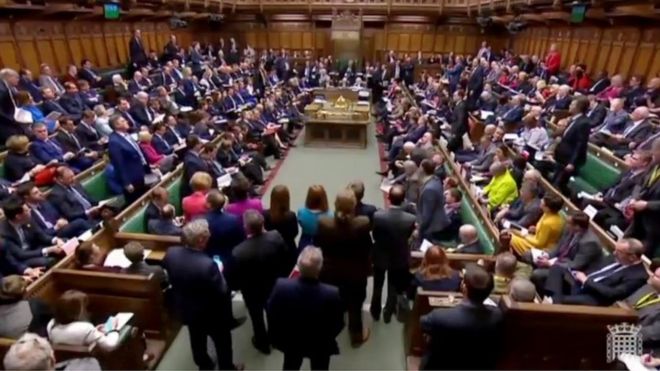London (Express Daily) Even with the Brexit countdown clock reset, the new deadline of April 12 suddenly doesn’t seem very far away.
In 11 days from now, unless something changes this week, the UK is leaving the European Union without a deal.
Over the next few days, politicians from Prime Minister Theresa May downwards will scramble to get a deal through — either the one the prime minister has spent months trying to get approved by the House of Commons only for it to be defeated three times, or a softer Brexit plan that is picking up support among lawmakers of all parties.
There is a strong chance of Parliament voting for a softer Brexit, maybe involving Britain staying in the EU single market; but there is equally a strong chance of a no deal.
High stakes
With such high stakes in place, there are now deep concerns among Brexiteer lawmakers that their prize of leaving the EU might be slipping away from them.
They have already lost the original date of Brexit, March 29 — but now a soft Brexit, which would still be a battle to implement, is more likely to gain support in the Commons at this point more than any other.
And sure enough, Brexiteers are planning to blame everyone but themselves for a harder Brexit slipping through their grasp.
Later Monday, MPs (members of Parliament) will vote on a new range of options to try to find out which Brexit outcome has the most support.
This exercise faltered last week because there was no outright majority for any of the ones on the table.
However, the two most popular versions, a softer Brexit with a customs union, and a second referendum, could pick up more support when the Commons has another chance to vote today.
These so-called indicative votes may even be held again on Wednesday, in a bid to zone in on a solution to months of deadlock.
Yet ahead of tonight’s votes, a group of more than 170 lawmakers from May’s own Conservative Party, including at least 10 Cabinet ministers, have taken preemptive action to try to stop a soft Brexit being passed by Parliament.
In a letter to the prime minister, they warn she risks “destroying” the Conservative Party and allowing the opposition Labour leader, Jeremy Corbyn, to become prime minister if she paves the way for a soft Brexit plan to become the official new Brexit deal.
The hopes of securing Brexit for those who voted for it would be in serious doubt. But what’s more, the letter shows that the Brexit blame game has already started.
However, considering that the prime minister’s existing deal has been defeated three times in Parliament by many of the same conservative MPs who have signed this letter, the only group who should carry responsibility for Brexit not yet happening is the Brexiteer conservative lawmakers themselves.
In holding out for a harder Brexit, or indeed a no deal, instead of voting for the Brexit deal on offer, has led to the possibility that the UK’s exit from Europe may not happen at all. The letter to the prime minister preemptively puts the blame for Brexit failing squarely in her hands.
Blame game
But the Brexit blame game is unlikely to stop there. MPs who voted Remain, and are now trying to save the British economy by trying to block a no deal, will be accused of destroying Brexit.
So too will Labour and all other opposition parties, as well as EU leaders and journalists. In truth, while May should carry responsibility for failing to get Parliament to gather round a consensus on Brexit, lawmakers have had plenty of opportunity to vote for Brexit via her plan. The opportunity to break the deadlock was there.
Instead, we are entering yet another week of stalemate in British politics.
Besides a customs union and a second referendum, lawmakers could Monday be voting on a plan for Common Market 2.0, which would see the UK remaining in the single market with some sort of customs arrangement.
If Parliament votes in favor of one option, the prime minister will chair her Cabinet Tuesday to decide the next steps.
This could involve her original deal brought back to the Commons for a fourth time, with MPs asked to choose between her deal and the new alternative on offer.
If May chooses to ignore any alternative deal voted by Parliament, she risks a constitutional crisis and, potentially, a general election.
Both main parties are preparing for the possibility of a snap election as a way out of the deadlock.
Unless Brexit is resolved in the next few days, expect the recriminations to fly.
